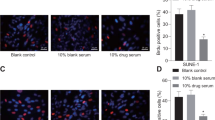Abstract
To demonstrate the effect of zoledronic acid in proliferation, invasion, and migration of human nasopharyngeal carcinoma cell HNE-1 and explore the potential role of VEGF, MMP-2, and MMP-9 proteins in vitro. Human nasopharyngeal carcinoma cell HNE-1 was exposed to various concentrations (0–40 μmol/l) of zoledronic acid. Zoledronic acid inhibited proliferation of HNE-1 cells though not in a dose-dependent manner. Zoledronic acid had exerted a dose-dependent effect on the migration and invasion of HNE-1 cells. Both expressions of mRNA and protein of MMP2, MMP9, and VEGF were reduced, respectively, detected by RT-PCR and Western blot assays. These data suggested that zoledronic acid not only inhibited growth but also invasion and migration of HNE-1 cells in vitro. The anti-cancer action of zoledronic acid was partially associated with the suppression of VEGF expression and secretion and downregulating the expression of MMP2 and MMP9.






Similar content being viewed by others
References
Mcderrmott AL, Dutt SN, Watkinson JC. The aetiology of nasopharyngeal carcinoma. Clin Otolaryngol Allied Sci. 2001;26:82–92.
Arango BA, Castrellon AB, Perez CA, Raez LE, Santos ES. Nasopharyngeal carcinoma: alternative treatment options after disease progression. Expert Rev Anticancer Ther. 2010;10:377–86.
Caponigro F, Longo F, Ionna F, Perri F. Treatment approaches to nasopharyngeal carcinoma: a review. Anticancer Drugs. 2010;21:471–7.
Razak AR, et al. Nasopharyngeal carcinoma: the next challenges. Eur J Cancer. 2010;46:1967–78.
Yuasa T, Kimura S, Ashihara E, Habuchi T, Maekawa T. Zoledronic acid—a multiplicity of anti-cancer action. Curr Med Chem. 2007;14:2126–35.
Clézardin P, Ebetino FH, Fournier PG. Bisphosphonates and cancer-induced bone disease: beyond their antiresorptive activity. Cancer Res. 2005;65:4971–4.
Winter MC, Holen I, Coleman RE. Exploring the anti-tumor activity of bisphosphonates in early breast cancer. Cancer Treat Rev. 2008;34:453–75.
Gnant M, et al. Endocrine therapy plus zoledronic acid in premenopausal breast cancer. N Engl J Med. 2009;360:679–91.
Rack B, et al. Effect of zoledronate on persisting isolated tumor cells in patients with early breast cancer. Anticancer Res. 2010;30:1807–13.
Denoyelle C, Hong L, Vannier JP, Soria J, Soria C. New insights into the actions of bisphosphonate zoledronic acid in breast cancer cells by dual RhoA-dependent and -independent effects. Br J Cancer. 2003;88:1631–40.
Hasmim M, Bieler G, Rüegg C. Zoledronate inhibits endothelial cell adhesion, migration and survival through the suppression of multiple, prenylation-dependent signaling pathways. J Thromb Haemost. 2007;5:166–73.
Goffinet M, et al. Zoledronic acid treatment impairs protein geranyl-geranylation for biological effects in prostatic cells. BMC Cancer. 2006;6:60.
Boissier S, et al. Bisphosphonates inhibit breast and prostate carcinoma cell invasion, an early event in the formation of bone metastases. Cancer Res. 2000;60:2949–54.
Ferretti G, et al. Zoledronic-acid-induced circulating level modifications of angiogenic factors, metalloproteinases and proinflammatory cytokines in metastatic breast cancer patients. Oncology. 2005;69:35–43.
Santini D, et al. Repeated intermittent low-dose therapy with zoledronic acid induces an early, sustained, and long-lasting decrease of peripheral vascular endothelial growth factor levels in cancer patients. Clin Cancer Res. 2007;13:4482–6.
Facchini G, et al. Metronomic administration of zoledronic acid, taxotere combination in castration resistant prostate cancer patients: phase I ZANTE trial. Cancer Biol Ther. 2010;10:6.
Aft R, et al. Effect of zoledronic acid on disseminated tumor cells in women with locally advanced breast cancer: an open label, randomised, phase 2 trial. Lancet Oncol. 2010;11:421–8.
Ottewell PD, et al. Differential effect of doxorubicin and zoledronic acid on intraosseous versus extraosseous breast tumor growth in vivo. Clin Cancer Res. 2008;14:4658–66.
Fabbri F, et al. Zoledronic acid increases docetaxel cytotoxicity through pMEK, Mcl-1 inhibition in a hormone-sensitive prostate carcinoma cell line. J Transl Med. 2008;6:43.
Giraudo E, Hanahan D. Zoledronia acid inhibit angiogenesis and impairs tumorigenesis in a mouse model of cervical carcinogenesis. Haematol Rep. 2006;2:39–41.
Bäckman U, Svensson A, Christofferson RH, Azarbayjani F. The bisphosphonate, zoledronic acid reduces experimental neuroblastoma growth by interfering with tumor angiogenesis. Anticancer Res. 2008;28:1551–7.
Soltau J, et al. Antitumoral and antiangiogenic efficacy of bisphosphonates in vitro and in a murine RENCA model. Anticancer Res. 2008;28:933–41.
Li YY, et al. Zoledronic acid is unable to induce apoptosis, but slows tumor growth and prolongs survival for non-small-cell lung cancers. Lung Cancer. 2008;59:180–91.
Karabulut B, et al. Docetaxel/zoledronic acid combination triggers apoptosis synergistically through downregulating antiapoptotic Bcl-2 protein level in hormone-refractory prostate cancer cells. Cell Biol Int. 2009;33:239–46.
Kessenbrock K, Plaks V, Werb Z. Matrix metalloproteinases: regulators of the tumor microenvironment. Cell. 2010;141:52–67.
Kliche S, Waltenberger J. VEGF receptor signaling and endothelial function. IUBMB Life. 2001;52:61–6.
Evans KD, Oberbauer AM. Alendronate inhibits VEGF expression in growth plate chondrocytes by acting on the mevalonate pathway. Open Orthop J. 2009;3:83–8.
Santini D, et al. Repeated intermittent low-dose therapy with zoledronic acid induces an early, sustained, and long-lasting decrease of peripheral vascular endothelial growth factor levels in cancer patients. Clin Cancer Res. 2007;13:4482–6.
Montague R, et al. Differential inhibition of invasion and proliferation by bisphosphonates: anti-metastatic potential of zoledronic acid in prostate cancer. Eur Urol. 2004;46:389–402.
Li YY, et al. Zoledronic acid is unable to induce apoptosis, but slows tumor growth and prolongs survival for non-small-cell lung cancers. Lung Cancer. 2008;59:180–91.
Author information
Authors and Affiliations
Corresponding author
Rights and permissions
About this article
Cite this article
Li, Xy., Lin, Yc., Huang, Wl. et al. Zoledronic acid inhibits proliferation and impairs migration and invasion through downregulating VEGF and MMPs expression in human nasopharyngeal carcinoma cells. Med Oncol 29, 714–720 (2012). https://doi.org/10.1007/s12032-011-9904-1
Received:
Accepted:
Published:
Issue Date:
DOI: https://doi.org/10.1007/s12032-011-9904-1




